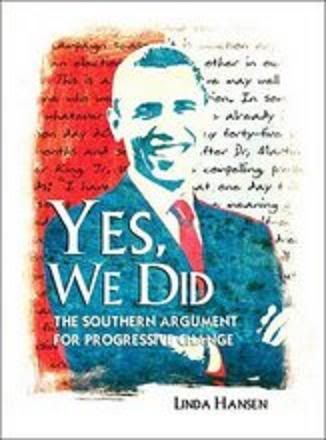 Why now, when a glut of “My Interpretation of Campaign 2008” books, by top tier writers, floods a shaky market?
Why now, when a glut of “My Interpretation of Campaign 2008” books, by top tier writers, floods a shaky market?
Because the experts, pundits and historians, will be analyzing, parsing and writing Election ’08 for decades. They will examine, in particular, how progressive voices impacted the demise of the ever-solid, hard-wired GOP Southern Bloc and how on earth an African American candidate put his own 18 million cracks in the uber-conservative ceiling down here.
Why this book? Because those experts, however well-meaning or broadly educated in all matters socio-political, are not Southerners. They are not writers who came of age in Jim Crow South Carolina. Nor are they ordinary citizens who live and work, eat and sleep, in the rural South.
It was an army of ordinary Southern voters who, when they closed the curtain behind themselves on election day, broke ranks and voted for the Democratic candidate.
Why this book? Because chronicling the columns and posts of a Southern journalist arguing for the end of the Dubya Doctrine and the beginning of an Obama Era may help explain why that surge of Southern voters said NO to the GOP on November 4, 2008. For us, it involved an epiphany; a surprising number of us found some light at the end of the Jim Crow tunnel.
Southerners are cantankerous about their politics. Liberal, in the Deep South, has been a four-letter word since Bleeding-heart Yankees turned the Democratic Party from the segregation-friendly party of “states’ rights” to the party of equal rights integration: shared opportunity, shared schools, shared water fountains and seats at the front of the bus.
Few people can speak better to the emergence, however tenuous, of a more progressive South in 2008 than the Southern writers who have argued for that kind of change.
Had this book ended as planned, on the high note story of Inauguration Day 2009, an argument about relevance might have been made. It was, in the main, a look back. But my editor, Wallace McBride, is the dream shepherd of every writer’s attempt to speak his/her truth to power. He responded in the affirmative when I said we needed a very last minute epilogue. Given the GOP’s finding its lost voice — that of the strident obstructionist minority in the face of a necessary stimulus bill — more had to be said. I ended the book on a fiery note; a warning to progressives and a challenge to conservatives.
Winning is not enough. We progressives must remain the vigilant, vocal activist community which helped turn the Southern tide just a small, healthy bit to the left, in 2008.
The progressive South should be heard. And we can speak for ourselves.
25 comments